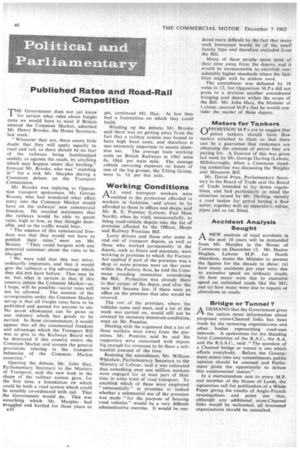Working Conditions
Page 48

If you've noticed an error in this article please click here to report it so we can fix it.
ALL road transport workers were entitled to the protection afforded to workers in factories, and about to be afforded to those in offices and shops, said Mr. R. E. Prentice (Labour, East Ham North), when he tried, unsuccessfully, to bring road-vehicle depots into the list of premises affected by the Offices, Shops and Railway Premises Bill.
Lorry drivers and those who came in and out of transport depots, as well as those who worked permanently in the depots, such as fitters and storemen, were working in premises to which the Factory Act applied if part of the premises was a shop or some process went on that came within the Factory Acts, he told the Commons standing committee considering the Bill. Protection was already there in that corner of the depot, and after the new Bill became law, if there were an office on the premises that also would be covered.
The rest of the premises, where the vehicles came and went, and a lot of the work was carried on, would still not be covered by statutory minimum conditions, went on Mr. Prentice.
Dealing with the argument that a lot of these workers were away from the premises, Mr. Prentice said he and his supporters were concerned with depots big enough for someone to be there a substantial amount of the time.
Resisting the amendment, Mr. William Whitelaw, Parliamentary Secretary to the Ministry of Labour, said it was estimated that something over one million workers were engaged for at least part of their time in some kind of road transport. To establish which of these were employed " substantially " in premises or indeed whether a substantial use of the premises was made "for the purpose of housing road vehicles" would be a very difficult administrative exercise. It would be ren
dered more difficult by the fact that many such. businesses would be of the small family type and therefore excluded from the Bill.
Many of these people spent most of their time away from the depots, and it would be unreasonable to establish considerably higher standards where the facilities might well be seldom used.
The amendment was defeated by 18 votes to 12, but Opposition M.P.s did not press to a division another amendment bringing coal depots within the scope of the Bill. Mr. John Hare, the Minister of La bou,r, assured M.P.s that he would consider the matter of these depots.




























































































































